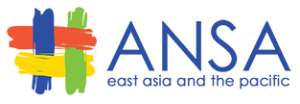ANSA-EAP pays special attention to the youth because this sector will provide the region’s next generation of leaders, advocates, and reformers. The donor community is drawn strongly to this sector for this reason.
There are more young East Asians and Pacific Islanders aged 12 to 24 than ever before. The number of young people in the region is at a historical peak of 450 million. They account for one-third of the developing world’s 1.3 billion youth population, largely because of the large youth populations in China, Indonesia, the Philippines, and Vietnam.
‘Special Focus’Investing in Young People in East Asia and the Pacific, ‘World Development Report 2007: Development and the Next Generation (The World Bank, 2006).
ANSA-EAP knows the window of opportunity to educate the region’s young on SAc and good governance has become smaller. This is why ANSA-EAP consistently invests in youth SAc activities that emphasize moral, social, and civic values formation. ANSA-EAP youth agenda moves in three directions:
- Client power’empowering young people’s capacity to actively engage in the provision of services, either by giving them the means to choose among providers or to participate in the management of decentralized delivery.
- Citizen voice’improving services to increase the ability of young people to articulate their needs and wants, and ensuring that policy makers listen.
- Provider compact’ensuring that providers have the right training, motivation, and incentives to deliver high quality for the young. (Examples include contracting with private providers to deliver youth-oriented services, with payment conditional on successful implementation, and by training providers to create more youth-friendly services.)
ANSA-EAP maintains a Youth Website at www.ansa-eapyouth.ning.com. Other activities include:
- YC3’a platform for the youth from different EAP countries to share and learn from these initiatives through the use of new media technology like videoconferencing and the Internet.
- Plutopia (http://apps.facebook.com/plutopia), an SAc online game on Facebook that incorporates the values of citizenship and social accountability in working for the betterment of the community.
Philippines:
- SAc orientation for Boy Scouts and Girl Scouts of the Philippines (Scouts in this country are on the forefront of ‘Textbook Watch’, a project that monitors the delivery of textbook to public schools).
- Assistance to the First Time Voters’ Network (firsttimevotersnetwork.ning.com) with the Student Council Alliance of the Philippines and the Center for Youth Advocacy and Networking, which encourages young Filipinos to register and vote for politicians that support policies favorable to the youth sector.
- ‘Social Accountability Forum with Young Muslim Leaders’, organized in cooperation with the Philippine House of Representatives Knowledge for Development Center.
Indonesia:
- Support to Indonesian Youth for Social Accountability (http://www.pattiro.org/). This group communicates with and networks young people of Indonesia from Sabang to Merauke who are concerned with issues of Social Accountability.
Cambodia:
- Support to the Youth Council of Cambodia (www.ycc.org.kh/) and the Outstanding Youth Group of Cambodia (www.oygcambodia.org).
- ‘Workshop on Monitoring School Facilities for Scouts’, March 2009, co-organized with the Khmer Institute for National Development in cooperation with the National Association of Cambodian Scouts. (This 2-day workshop trained 32 Boy Scouts and 24 Girl Scouts from high schools in Kandal Province and Phnom Penh.)
